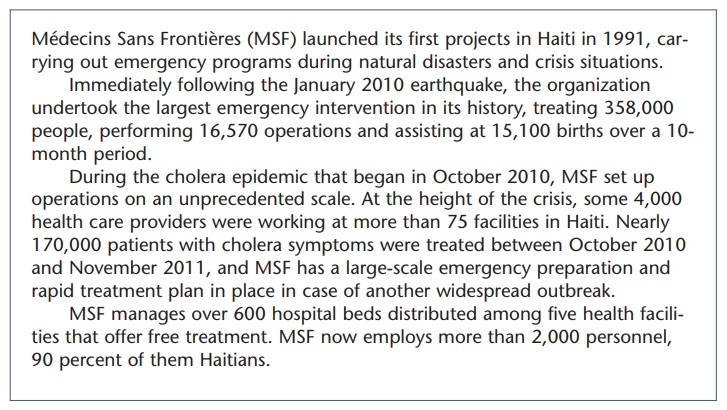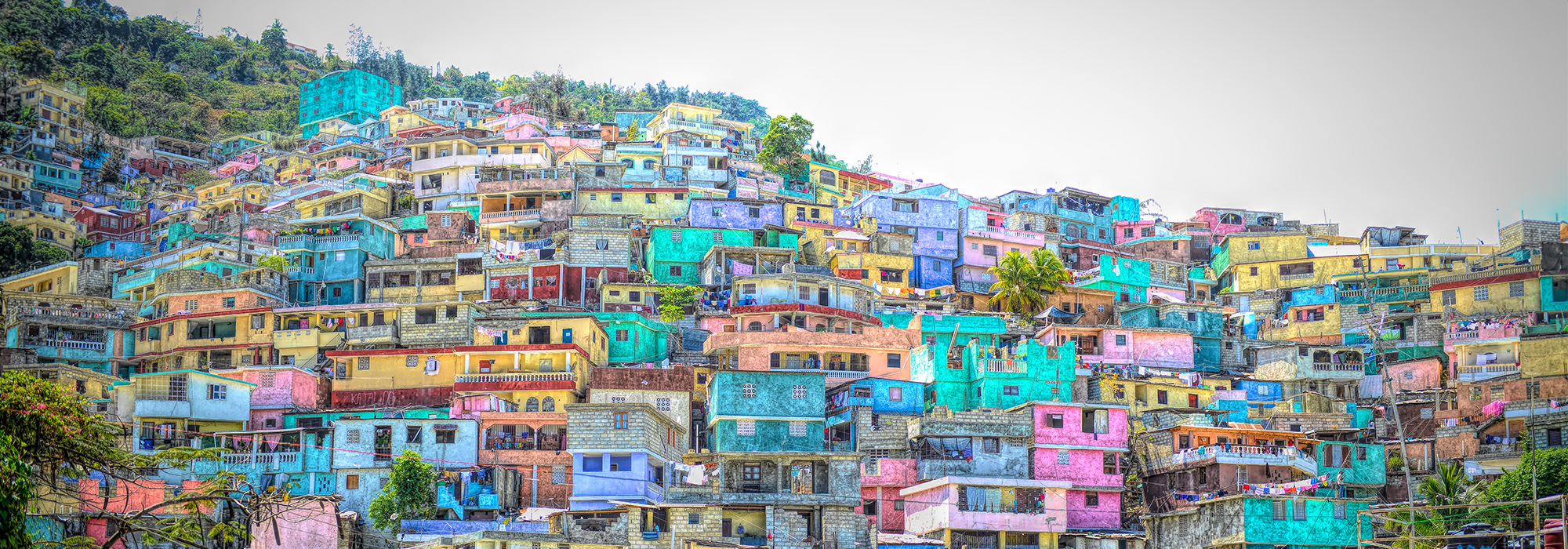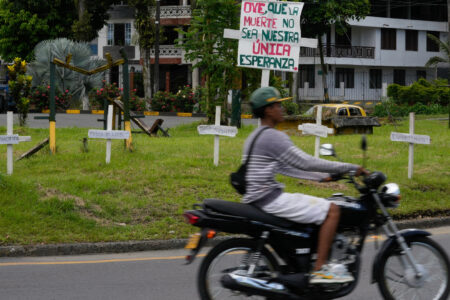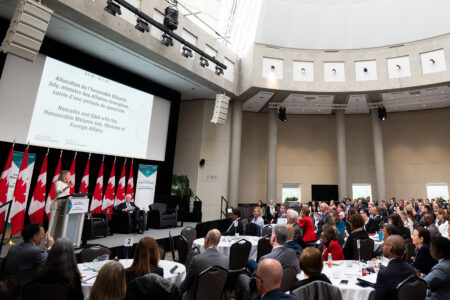
As a young freelance journalist covering the 1990 elections in Haiti, I felt there was a sense that this would be a turning point for a country that had been fiscally and emotionally drained by its ruling class. “Violence absent in Haitian vote,” ran my headline in the Globe and Mail, because such calm was actually surprising after a campaign marked by revenge mobs and threats. The menacing Duvaliers were gone; there was a high turnout of engaged citizens casting ballots for the first time; international elections monitors had declared the vote fair enough; and the people of the bidonvilles placed their faith in a champion of the poor, Jean-Bertrand Aristide.
The narrative of grinding disappointment resumed almost immediately, thanks to a habit of economic despoiling and faulty governance, to name but a couple of failures in the decades that followed.
The next time I returned to Port-au-Prince was in January 2010, a week after the earthquake, to join an emergency team of humanitarians. The world was focused on Haiti’s tragedy, on helping. Aid agency coffers filled with the good intentions of generous donors, an estimated $3 billion’s worth. Governments including Canada’s pledged to give a total of $5.5 billion over the next two years with promises of an additional $9.9 billion over the next decade to rebuild the country better than it was before. For a time I believed this money and goodwill might create extraordinary momentum for the country to finally stand tall. And maybe it will, but many of us who have closely followed the story do not expect a Hollywood ending.
President Michel Martelly, who was elected in April 2011, and others expressed their scorn toward the aid industry and the international community after the United Nation’s special envoy for Haiti published a report “Has Aid Changed? Channeling Assistance to Haiti Before and After the Earthquake” in June 2011. The report revealed that only 1 percent of the C$2.4 billion relief and reconstruction money has flowed directly to the Haitian government. An estimated 34 percent went to pay for the emergency services provided by donor countries and their military forces on the ground. The Canadian Forces sent its Disaster Assistance Response Team (DART). DART is expensive, often slow to activate and reaches fewer beneficiaries than other forms of assistance, but it serves as a positive exercise in national branding. International nongovernmental organizations (NGOs) and private contractors were reported to have raked in 26 percent of the aid money. The UN’s special envoy for Haiti recently provided an update: only 53 percent of the money pledged for reconstruction projects in 2010 and 2011 has been sent.
For someone like myself employed in the NGO sector, it is a challenge to defend our collective track record of addressing, just as an example, the emergency health needs. Long before the earthquake in 2010 Médecins Sans Frontières (MSF), as a medical humanitarian actor whose work in Haiti continues to be entirely financed by private donors, has advocated on behalf of the 80 percent of the population that was more or less excluded from basic health services because they could not afford to pay the fees. The argument that NGOs created unfair competition for the private health care sector ignores this simple truth. Maternal mortality rates have long been of particular concern. According to the World Health Organization (WHO), Haiti’s maternal mortality rate was 300 per 100,000 in 2008 (just for comparison’s sake, Canada’s was 12 per 100,000). Among other specialized hospitals offering free care in Port-au-Prince and Léogâne, MSF operates an emergency obstetrics hospital.
The global response with respect to aid for health care before and since the earthquake has been a patchwork. The Canadian International Development Agency has generally taken a classic bilateral approach to cooperation and is now, to its credit, investing $20 million in a maternal and infant health program called Maman ak Timoun en santé (Healthy Mothers and Children), which promises free obstetric care.
There appear to be weaknesses in the administrative oversight of the program, which are complicated by the lack of coordination of actors supporting the national Ministry of Public Health and Population on the ground.
While improvements in the health sector have suffered from the lack of a long-term, systemic approach, the greater outrage is how even these noble efforts actually undermined the effectiveness of the response to the cholera epidemic that started in October 2010. Since then, it is reported, there have been 7,000 deaths among the 524,000 cases. At the height of the crisis, some 4,000 MSF staff worked in more than 75 facilities around the country. They treated nearly one-third of all patients with cholera symptoms.
After the earthquake there were more than 400 NGOs registered with the WHO’s health cluster, part of the UN coordination mechanism aimed at ensuring that offers of medical assistance could be directed to places where there were urgent gaps. Leadership and accountability were the cornerstones of the cluster’s strategic ambitions. Even if a group’s operations were amateur, their participating in coordination meetings conferred legitimacy in marketing toward donors.
There was a panoply of inexperienced, unequipped, disorganized individuals who descended on the disaster zones with brief spurts of financial backing from their churches and/or communities. The aid circus seems to get wilder with each emergency. Most of these international volunteers left Haiti within a few weeks, leaving behind an unconscionable number of orthopedic trauma patients who needed months of postoperative care, rehabilitation and pain management.
Long before the earthquake in 2010 Médecins Sans Frontières, as a medical humanitarian actor whose work in Haiti continues to be entirely financed by private donors, has advocated on behalf of the 80 percent of the population that was more or less excluded from basic health services because they could not afford to pay the fees.
The health actors who remained behind — some of them NGO juggernauts — continued to raise money on the back of the emergency more than a year after the quake, but were sometimes reluctant to invest resources to save the lives of those sick and dying of cholera.
The aid sector had its eye on reconstruction and systemic change. The money allocated to health care would be used to establish a more sustainable system through inter-agency planning and coordination. To divert attention to a major emerging health crisis, cholera, could slow the quest toward long-term development, according to some leading NGOs. It seemed from our perspective that the needs of the system appeared to be trumping the pressing needs of people in crisis.
The Haitian health ministry quickly realized that there was a paralysis in the health cluster with respect to the emergency and it was not going to be of much use to help it manage the epidemic. Officials turned to those who had not participated in the cluster system — including MSF and an impressive contingent of Cuban physicians — to shoulder 80 percent of the treatment caseload through those first three months.
We lobbied publicly for others to help out and for attention to be paid to outbreak control. Much to our chagrin, there are still chronic gaps in the prevention effort: vector control through chlorinated water, proper sanitation and waste disposal. The majority of the aid services continue to give preference to earthquake victims living in the camps, whereas the cholera risk is higher in slums and rural villages. These areas suffered relatively less destruction and thus did not benefit as much from the provision of latrines and potable water points. The annual rainy season, starting in April, will increase the risk of spreading the bacterial contamination.
The public would logically expect humanitarian NGOs, the UN agencies and the various levels of Haitian public services to adapt to desperate needs. Vaccination against cholera has been floated as a quicker protection, but its feasibility in the short term is limited by several factors. Oral vaccines, which provide 70 percent effectiveness for three years, are in short supply. The organization Partners in Health will be distributing oral vaccines in a few communities, a total of 1 percent of the Haitian population, in the hopes of establishing the value of targeted approaches. Of course the best way to thwart cholera would be to improve the water and sanitation systems for all.
The historic mobilization of international assistance for Haiti will stand as a precedent in the application of Murphy’s Law for humanitarian aid. This is not to discount the many impressive efforts of thousands of Haitian and international NGOs. Clearly, in the aftermath of a disaster, democratic elections are not sufficient; nor, even, are piles of money
Among the many conclusions that could be drawn more than two years after the earthquake is that the coordination mechanisms that have become standardized through the UN’s Office for the Coordination of Humanitarian Affairs are far too inflexible to provide responsive emergency aid in the event that the situation becomes unexpectedly more complex.
Humanitarian aid and development cooperation can be seen as a multidimensional continuum, where the investment required for emergency response is different from that required to meet rehabilitation and reconstruction goals. This applies to Haiti as much as any other place, such as Afghanistan. To initiate systemic recovery efforts early in an emergency tends to slow the provision of humanitarian assistance, which needs to be more flexible.
This is raising questions about whether NGOs in countries like Haiti should continue to play such a dominant, and seemingly permanent, role in providing essential public services such as health and education. The assumption is that democratically elected governments, even politically volatile or neglectful ones, will assume their responsibilities and that international donors will funnel money directly into the recipient government’s coffers while limiting their role to accountability oversight. President Martelly is urging international donors to focus on trade, not aid. Who would not argue that Haitians need jobs, and the country needs to get its economy rolling? We all want that. The chronic under-financing of the national budget requires that there be a tax base within the country.
The issue is what to do about critical needs that are not covered, for one reason or another, either by the public sector or international aid. The current organizational structure, which focuses on the coordination of potential or theoretical capacity in Haiti, has not resulted in increased efficiency. The lack of organization of the aid is entrenched. Some NGOs are contributing to the alleviation of suffering, but others are more skilled in marketing their fundraising campaigns than in achieving anything meaningful. This imbalance is receiving little media scrutiny in the donor countries.
Some 500,000 Haitians are still living in tent camps, in which hygienic conditions are said to be deteriorating. Fully 80 percent of all Haitians have no access to adequate sanitation. Epidemiologists expect the cholera epidemic to continue for two or three years before it stabilizes as an endemic health factor. The Interim Haiti Recovery Commission, led by Bill Clinton, approved some projects, but it didn’t find the necessary funding for most of them.
As someone who shares responsibility for increasing the visibility of MSF’s medical action in Haiti, I wish I could present concrete solutions to fix the lack of choice and opportunity of Haitians. I’ve at least learned to keep my expectations more realistic about the ability of a flawed humanitarian machine and the aid economy to address critical needs.
Photo: Shutterstock






